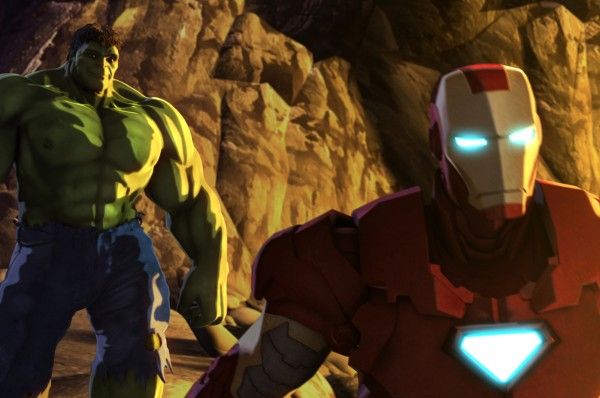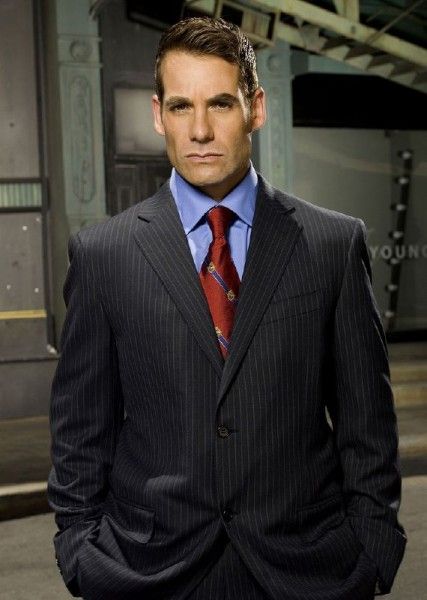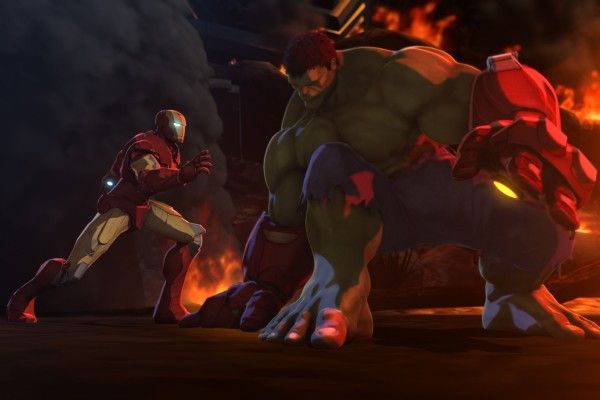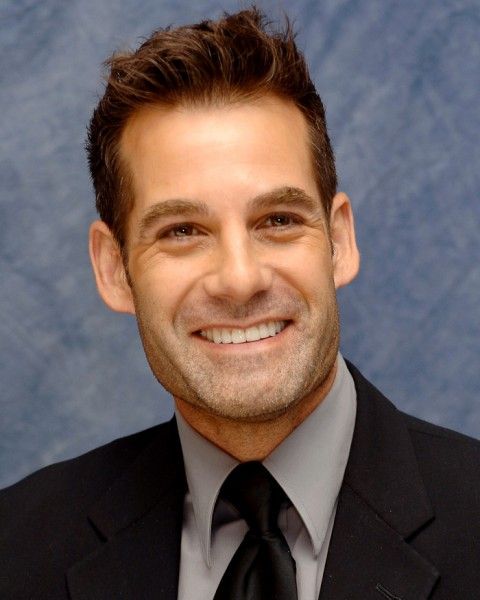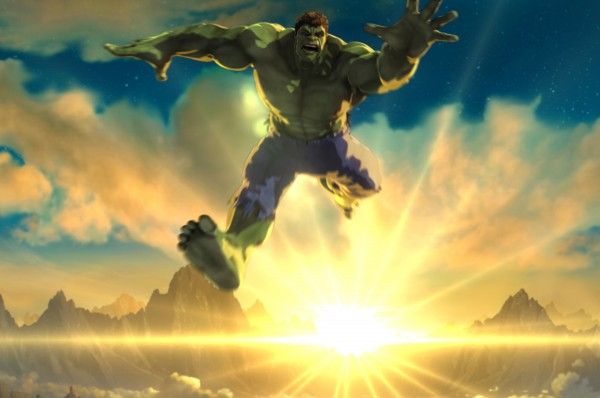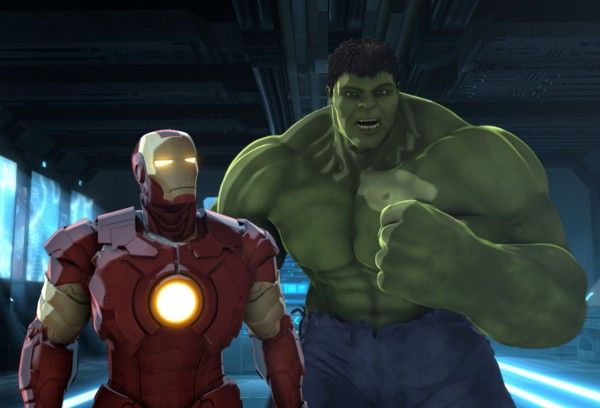Iron Man & Hulk: Heroes United, now out on Blu-ray combo pack, is one of the greatest heroic team-ups in the universe. With The Hulk’s brute strength and Tony Stark’s high-tech intellect, the two come together to create a powerful duo necessary to face off against one of the most dangerous enemies – a seemingly invincible, energy devouring monster known as Zzzax. Featuring the voice talent of Adrian Pasdar and Fred Tatasciore, the story is packed with explosive action and loaded with bonus features.
During this recent exclusive phone interview with Collider, actor Adrian Pasdar talked about how his involvement with the TV show Heroes helped him land the gig voicing Tony Stark/Iron Man, how much it adds to their performances to be able to record their voice work together, the different approach to bringing the character to life in animated form versus the live-action movies, and how much he enjoyed recording Iron Man & Hulk with Fred Tatasciore. He also talked about his latest role, in the Chris Carter series for Amazon called The After, what he thinks about the platform branching out into original content, and how he thinks it’s about time that people get a real say in the type of content they’re viewing. Check out what he had to say after the jump.
How did you come to voice Iron Man for all of these different projects?
ADRIAN PASDAR: I was doing voice work. I had done a few comic book characters, simply because I had been on Heroes. It’s funny how that works. You do a couple of superhero things and then, all of a sudden, they want to get you because there may be some name value. There’s probably somebody out there who has been dying to be Tony Stark, their whole life, and it will never happen. And then, it comes to me because I happened to do Heroes. I mean, I love it. I’m totally respectful of the position, but I wasn’t pursuing it. I was in Ireland and Jeph Loeb, who is one of my friends from Heroes on Season 1 – he’s a great guy – and he was over there at Marvel, heading up this department, and he called and asked me if I wanted to be a part of it. It was in its genesis stage then, and I said, “Sure, but I’m in Ireland and I will be through Christmas.”
So, through another set of fortuitous circumstances, the whole thing got pushed back until the spring of two years ago. That’s when we started. I happened to be in town, and it’s worked out really wonderfully. It develops, over the course of it. It’s a room full of eight people, and the nature of the people I’m in the room with, they’re highly trained professionals. They do this for a living. It’s a room full of grown-ups acting like 10-year-olds, who have the amazing power of imitation and mimicry. Their voices go all over the place. You think you’re in the room with anybody you’ve ever met or wanted to meet. They can do any voice. So, the real hard thing sometimes is concentrating. I’m not nearly as talented as those guys are, so in the beginning, it was rough to get my footing. But now that we’ve been at it for a year, I can chime in with the occasional zinger and I feel like I’m more a part of the team.
Does it feel like it’s both an advantage to be surrounded by people who have been doing it for so long, while also being a distraction?
PASDAR: Those are the two things it is. Ultimately, it’s defined by those two elements. You really have to bring your game and know what you want to do. And then, there are the producers and the writers and the director on the other side of the glass, and what they want. You have to be malleable to what’s going to work, and you have to stay in the framework of the context. It’s a kids’ show, so you can’t get too layered. You don’t want to dumb it down, at all, but you don’t want it to get too complicated and trip over itself. The lines have to be pretty straightforward, but just edgy enough to keep the adults interested. That’s the real challenge. I’m used to working with a rehearsal process and your body. It’s a different thing to just be a voice. It’s liberating, on one hand, because you get to show up in sweatpants and with Doritos on your fingers, but on the other hand, it’s limiting because it’s just your voice. You have to pack it all into just your voice. We record our stuff first, and then it goes to the animators and they match what we’ve done. And sometimes they have ideas and we have to rework some of the dialogue in ADR. And then, they’ll polish it a little bit more. In the end, it’s a blind collaboration between a myriad of people who never meet. I lay down the dialogue, and I see the producers, writers and director, but that’s it. Then, it goes over to Disney and the elves get to work.
Do you feel like it makes a difference to your performance that you all get to record together?
PASDAR: Sometimes we’re apart. If I’m in New York, I get to record there. I’ll be on an ISDN patch with the director and I’ll do all of my lines without the benefit of having anyone else with me. The only up-shot to that is that it’s faster. But, you need to be in the room for the energy and the relationships. It makes all the difference in the world because you get to be with the people that you’re working with. You can see them, and you can see when they’re gonna stop talking. You get a physical sense, from their body, of the rhythm of the language. If you’re standing next to them, it’s more of a conversant deal than just trading lines, back and forth, and the recording totally benefits from that.
Were you much of a comic book or cartoon fan, growing up?
PASDAR: I wasn’t really a big comic book guy, growing up. I watched cartoons, but the choices were a whole heck of a lot slimmer. There was Speed Racer and Scooby Doo. Scooby Doo wasn’t on for that long. They’ve run forever, on a loop, in perpetuity. So, I thought, “If I do this now, maybe my great-great grandchildren will have at least some connection to what I used to do, and I’ll be able to communicate with them through the magic of cartoons.”
When you signed on to be a part of the Marvel universe, did you have any idea how much it would grow and how many projects you’d get to do?
PASDAR: No, I didn’t. I really didn’t. It kept getting bigger. It’s the same world of people, for the most part. The XBOX stuff was all new. We did that over at Warner Bros., and that was a whole new bunch of people. My kid loves playing that. He’ll play it, and then look at me, and then watch the screen, and then look at me. He’ll say, “Daddy, say that line,” and I’ll say it just like I said it. He just shakes his head and thinks it’s weird. He said, “It’s hard to play while you’re in here, dad.” That’s where it’s really fun. Your kids can connect with you on a different level. He looked at me the other day and said, “Dad, I’m probably the only kid in the world that’s playing the game right now with the guy who voices the character standing next to me.” I said, “Not probably, son. You are.” He looked at me and said, “Well, that’s pretty cool.” That’s fun! The different arenas that I’ve been able to do Iron Man in are fun, but some more than others. The anime that we did early on was tough. That was the hardest one. It was a reinterpretation of a reinterpretation. I don’t think I’d do that again. When you can’t do it in the language, you’re just paraphrasing and it’s not as effective. But, the rest of it has been really fun.
When you’re a part of bringing a character like this to life, can you feel any sense of ownership of him, however small that might be?
PASDAR: Sometimes, but mostly no. Very, very infrequently do my intentions, vocally, match up with exactly what 40 other people are thinking, from the animators to the sound effects to the recording. I’d have to direct the show for it to be my exact thought process of what I’m seeing. So, nine times out of ten, I’m trying to meet someone else’s expectations, whether it’s the director or the writer or the animator, when I go back in to re-record a line. I’m the icing on the cake, but the cake is the thing. I’m really just a hood ornament on a very solid vehicle. I’m the flashy hood ornament. They don’t interview the guy that writes it very often. That’s a specific magazine. I get the interviews. I get the recognition and people go, “Oh, Iron Man!,” but there are so many other people that are responsible for this, that have way more to do with it than I do. So, I can’t say, in any way really, that I take ownership of it. It’s fun to be a part of, but that’s about it.
Rather than trying to match or live up to Robert Downey Jr.’s performance as Iron Man, is it more about living up to the portrayal of the character that have been established and the qualities of the character that are already known by fans?
PASDAR: Yeah, pretty much. There’s a cadence that Downey has that’s very quick, and then very slow, and he meets those two things perfectly. It’s served him well, his whole career. It’s a snarky, sardonic, wonderful delivery that he has. We’re not afforded that luxury in this cartoon because our target audience is a little different. It’s a cartoon world. I have to say 15 words in the space of where I would say five, and it’s really hard. You lose a whole lot of personality through that process. Whether that’s a good thing or a bad thing is not for me to say. It’s just a real thing. The minute you get in there and you have to, all of a sudden, make the script work, you lose any kind of fantasy about trying to mimic or match what the movies have become. It’s more like, “How do we make this work, in the context of what the cartoon is?” He’s a billionaire philanthropist playboy, but you have to be really clever to make that world work for an eight-year-old.
With all of the really cool things that Tony Stark and Iron Man get to do, do you ever wish you got to do any of it as live-action, instead of just voicing it?
PASDAR: It would be fun to be a part of that world, for sure. I’ve done it on a minor level on TV, but never in a film. It would be fun. But, I’m really happy to have this chance to do this for all the more personal reasons. Every Sunday morning at 11, it’s a new episode for my 9-year-old. It’s not as big. It’s not as fancy. It’s not as well-known. It’s not as glitzy. It’s certainly not as high-paying. But it’s just as rewarding, in its own, very personal way, for me and for my children.
Was it fun to get to have some more in-depth interaction between Iron Man and The Hulk, for Iron Man & Hulk: Heroes United?
PASDAR: Yeah. Fred [Tatasciore] is a great guy. He’s been The Hulk forever. The two of us in a room together is just really fun. I’d love to have the opportunity to blow it more wide open and make it a not just for kids story. I think it would be more fun, in terms of the situations that we could be in. If they made it more of an adult-oriented cartoon with The Hulk and Iron Man, that might be even more fun. But, it was great to work with him. We had a lot of fun. We always do, even just on Avengers Assemble. It’s rewarding just to be in the room with him.
You also recently did the Chris Carter series, The After, for Amazon, didn’t you?
PASDAR: Yeah, it was really fun.
What’s it like to have all of these new possibilities, as an actor? Is it exciting to do a show for Amazon, who is open to doing original programming now?
PASDAR: It’s different. It’s more like doing a cable series. It’s the best of both worlds, in a way. It’s a whole new paradigm. Because it’s for Amazon, they’re not writing for commercial breaks. Every hour of TV is 43 minutes, really, with 17 minutes of commercials. An hour for Amazon is an hour, just like an HBO or Showtime show. It’s got that same format. It’s a solid hour, and there’s no barrier for what your content can be, for language and nudity and whatever. It’s wide open to do whatever needs to be done to tell the story. And their responsibilities are much lower. They don’t have a whole network to run. There’s only a few shows that they’re responsible for, and they’re brand new. What’s going to define itself as a hit for them is still to be decided. When do you say that it’s made its money back? It’s hard to know.
They’ve got their own advertising platform. It’s a perfect distribution process because it’s already in place. Everybody knows Amazon.com. And you can just advertise the heck out of it online, right there. It can be your banner. You can make everybody hyper-aware of when exactly it’s debuting, when it’s available and how much it’s going to cost. The distribution part is already in place, which is a huge element to making something successful. That’s a whole new dynamic.
More and more people are watching entertainment on their phones. On a plane or on a train, or whatever, you see people with their headphones and they’re looking at their iPhone or their Galaxy. You’re reducing a medium that’s meant to be seen on your 65-inch plasma screen at home for your 4-inch monitor on the train. People are ready to do either, and the content has to work on both. How do you make that work? How do you do a special effects shot that’s good on a 65-inch, but sells just as well on a phone. It’s hard to know when it’s successful and when it fails, in the new world. It’s good to be a part of something like this ‘cause I’m working with some really, really talented people. It’s fun to redefine the boundaries and the goal lines and see what’s successful and what’s not.
How do you feel about the idea that customers are encouraged to provide feedback to determine whether a pilot will go to series?
PASDAR: I think it’s about time. They’ve always done that. If you ever go behind the glass and look at the focus groups that are deciding what you’re gonna watch, it’s scary. This cross-section of people they just happen to bring in to decide the fate of mankind on television is really scary. So, it’s about time that the rest of us – people who aren’t selected to come in – get a say. The thing is, when you put a button in someone’s hand and give them the power of yes or no, no is a shorter word. People just say no. The power lies in who can say no the most. But, real power, though, lies in the opportunity to say yes. I think people ultimately realize that, but not when they’re in the spotlight. When they’re able to be at home and contribute to what they think is good and bad, you get a better cross-section of what people are really wanting to see. I also know that the vitriol and hyperbole that exists online, and the anonymity, can be deadly because it’s cloaked in negativity and it’s brutal sometimes. If they can parse out what they need and what the overwhelming concerns are and the direction people what the show to go in, it can be valuable. But like anything else, if it’s applied indiscriminately, I think it can be dangerous. People ultimately get what they deserve on TV. What people end up watching is what the advertising end up glomming onto and promoting. Quality is there. You always have good shows and bad shows. People want a certain amount of each. It’s just widening the market a little bit. The involvement of people at home is just broadening things.
What was the appeal of The After, for you? Was it to work with Chris Carter?
PASDAR: To be honest with you, I figured out what the show was about on the very last day of filming. I said what I thought it was about, and he just smiled at me. I was like, “You son of a gun! Oh, I get it. Okay.” And he was like, “Yeah.” They’ll figure it out, eventually, but I wish he would have told me before we got to the last day of filming. But he said, “No, you did brilliant. You did exactly what you needed to do. Think about it, if you’d have done it any differently, knowing what you do now, that would have changed it, and maybe not for the better.” I thought about it and realized that either Chris Carter is a genius or he’s manipulative. I’m leaning more towards genius because he’s my boss. He’s a really nice guy who plays his cards very close to his vest. In this day and age, when everybody wants to be liked based on their performance so quickly, Chris Carter is one of those guys who’s going to let his work decide what you think about him. When he’s done working, then you’ll be able to decide. In the meantime, he doesn’t need your approval. That’s the kind of guy he is.
He’s like, “Look, let me build this chair for you, and then see if you want to sit in it. But don’t comment, the whole time I’m building it, on what you want the chair to feel like and look like.” If he was a carpenter, that’s the way he’d be. I really appreciate and admire that in an architect, or in somebody who’s constructing a series. Let the man do his job, and then we’ll see if it’s good or not. And he has a pretty good track record, so the odds are that it’s gonna be successful. I got a vague feeling, somewhere in the middle, that we were on a Heroes-esque potential trip. For Season 1, anyway, before things blew up in its face. That show went off the rails, but in Season 1, you could barely hold on, it was moving so fast. It’s a little bit different structure, but there’s still elements of it. It’s about a group of very disparate people going through an event together. That’s what The After is. If it turns out well and the writing is consistent, I think it has a pretty good chance of being successful.
Iron Man & Hulk: Heroes United is now available on Blu-ray.

